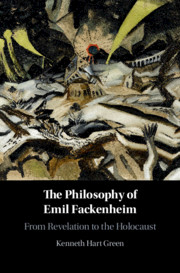Book contents
- The Philosophy of Emil Fackenheim
- The Philosophy of Emil Fackenheim
- Copyright page
- Dedication
- Epigraph
- Contents
- Acknowledgments
- Abbreviations
- Introduction The Unending Struggle with Revelation in the Thought of Emil Fackenheim
- 1 What Is Faith?
- 2 Individual versus Collective, Rational versus Mystical
- 3 Revelation as a Possibility
- 4 On Authority, Tradition, and History
- 5 Divine Power versus Human Freedom
- 6 From Presence to History
- 7 Confronting Radical Evil as Rupture
- 8 Diabolical Revelation and the Holocaust
- 9 Negative Absolute and Fragmentary Transcendence
- Conclusion Revelation of the Diabolical Truth in History
- Bibliography
- Index
9 - Negative Absolute and Fragmentary Transcendence
Published online by Cambridge University Press: 06 October 2020
- The Philosophy of Emil Fackenheim
- The Philosophy of Emil Fackenheim
- Copyright page
- Dedication
- Epigraph
- Contents
- Acknowledgments
- Abbreviations
- Introduction The Unending Struggle with Revelation in the Thought of Emil Fackenheim
- 1 What Is Faith?
- 2 Individual versus Collective, Rational versus Mystical
- 3 Revelation as a Possibility
- 4 On Authority, Tradition, and History
- 5 Divine Power versus Human Freedom
- 6 From Presence to History
- 7 Confronting Radical Evil as Rupture
- 8 Diabolical Revelation and the Holocaust
- 9 Negative Absolute and Fragmentary Transcendence
- Conclusion Revelation of the Diabolical Truth in History
- Bibliography
- Index
Summary
Fackenheim is scandalized by previous responses to the Holocaust, which he considers either derisory, misguided, or partial. Hannah Arendt’s assessment of Eichmann, for example, adopted a “stance of ‘clinical’ detachment – and lapsed into irony,” and this Fackenheim judges gravely deficient. At the other end of the spectrum, Terence Des Pres adopts an “archaic, quasi-religious vocabulary” in his effort to understand the unique characteristics of “the survivor,” but tells only half the story, for he could not write about the perpetrators, on the grounds that “for a writer to identify with them would be his ultimate corruption.” Fackenheim offers his own approach as a badly needed correction. He believes that the full truth about the Holocaust cannot be comprehended without recognizing its unprecedented evil as historical fact. This imposes what he sees as a duty and a challenge to reassess all previous conceptions of evil, and all previous responses to evil in human history, because he finds them inadequate to deal with the Holocaust.
- Type
- Chapter
- Information
- The Philosophy of Emil FackenheimFrom Revelation to the Holocaust, pp. 318 - 365Publisher: Cambridge University PressPrint publication year: 2020



